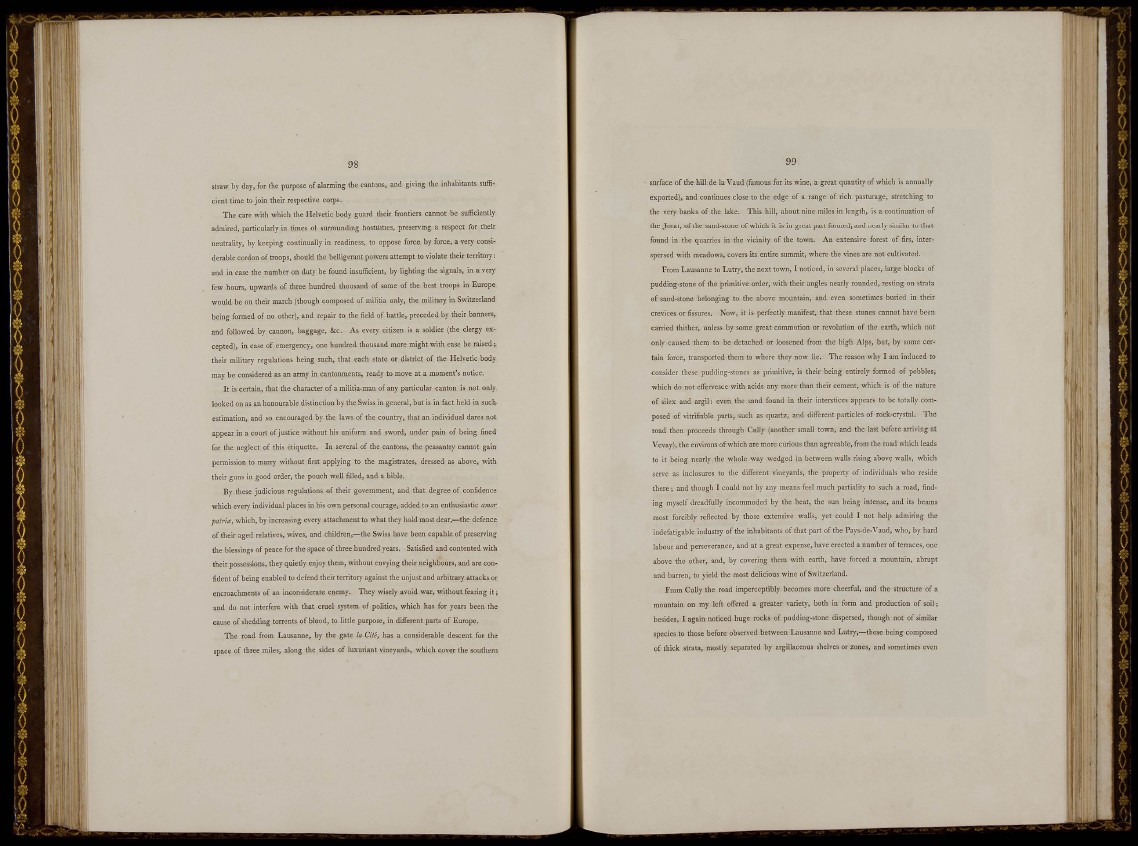
straw by day, for the purpose of alarming the cantons, and giving the inhabitants sufficient
time to join their respective corps.
The care with which the Helvetic body guard their frontiers cannot be sufficiently
admired, particularly in times of surrounding hostilities, preserving a respect for their
neutrality, by keeping continually in readiness, to oppose force by force, a very considerable
cordon of troops, should the belligérant powers attempt to violate their territory :
and in case the number on duty be found insufficient, by lighting the signals, in a very
few hours, upwards of three hundred thousand of some of the best troops in Europe
would be on their march (though composed of militia only, the military in Switzerland
being formed of no other), and repair to the field of battle, preceded by their banners,
and followed by cannon, baggage, 8cc. As every citizen is a soldier (the clergy excepted),
in case of emergency, one hundred thousand more might with ease be raised}
their military regulations being such, that each state or district of the Helvetic body
may be considered as an army in cantonments, ready to move at a moment's notice.
It is certain, that the character of a militia-man of any particular canton is not only
looked on as an honourable distinction by the Swiss in general, but is in fact held In such
estimation, and so encouraged by the laws of the country, that an individual dares not
appear in a court of justice without his uniform and sword, under pain of being fined
for the neglect of this étiquette. In several of the cantons, the peasantry cannot gain
permission to marry without first applying to the magistrates, dressed as above, with
their guns in good order, the pouch well filled, and a bible.
By these judicious regulations of their government, and that degree of confidence
which every individual places in his own personal courage, added to an enthusiastic amor
palrite, which, by increasing every attachment to what they hold most dear,—the defence
of their aged relatives, wives, and children,—the Swiss have been capable of preserving
the blessings of peace for the space of three hundred years. Satisfied and contented with
their possessions, they quietly enjoy them, without envying their neighbours, and are confident
of being enabled to defend their territory against the unjust and arbitrary attacks or
encroachments of an inconsiderate enemy. TThey wisely avoid war, without fearing it ;
and do not interfere with that cruel system of politics, which has for years been the
cause of shedding torrents of blood, to little purpose, in different parts of Europe.
The road from Lausanne, by the gate la Cilé, has a considerable descent for the
space of three miles, along the sides of luxuriant vineyards, which cover the southern
•'I ?
hlini
•• surface of the hill de la Vaud (famous for Its wine, a great quantity of which is annually
exported), and continues close to the edge of a range of rich pasturage, stretching to
the very banks of the lake. This hill, about nine miles in length, Is a continuation of
the Jorat, of the sand-stone of which it is In great part formed, and nearly similar to that
found in the quarries in the vicinity of the town. An extensive forest of firs, interspersed
with meadows, covers its entire summit, where the vines are not cultivated.
From Lausanne to Lutry, the next town, I noticed, in several places, large blocks of
pudding-stone of the primitive order, with their angles nearly rounded, resting on strata
of sand-stone belonging to the above mountain, and even sometimes buried in their
crevices or fissures. Now, it is perfectly manifest, that these stones cannot have been
carried thither, unless by some great conunotlon or revolution of the earth, which not
only caused them to be detached or loosened from the high Alps, but, by some cer-
• tain force, transported them to where they now lie. The reason why I am induced to
consider these pudding-stones as primitive, is their being entirely formed of pebbles,
which do not effervesce with acids any more than their cement, which is of tlie nature
of silex and argil: even the sand found in their interstices appears to be totally composed
of vitrifiable parts, such as quartz, and different particles of rock-crystal. The
road then proceeds through Cully (another small town, and the last before arriving at
Vevay), the environs of which are more curious than agreeable, from the road which leads
to it being nearly the whole way wedged In between walls rising above walls, which
serve as inclosures to the different vineyards, the property of individuals who reside
there; and though I could not by any means feel much partiality to such a road, finding
myself dreadfully incommoded by the heat, the sun being intense, and its beams
most forcibly reflected by those extensive walls, yet could I not help admiring the
indefatigable industry of the Inhabitants of that part of the Pays-de-Vaud, who, by hard
labour and perseverance, and at a great expense, have erected a number of terraces, one
above the other, and, by covering them with earth, have forced a mountain, abrupt
and barren, to yield the most delicious wine of Switzerland.
From Cully the road imperceptibly becomes more cheerful, and the structure of a
mountain on my left offered a greater variety, both in form and production of soil 5
besides, I again noticed huge rocks of pudding-stone dispersed, though not of similar
species to those before observed between Lausanne and Lutry,—these being composed
of thick strata, mostly separated by argillaceous shelves or zones, and sometimes even